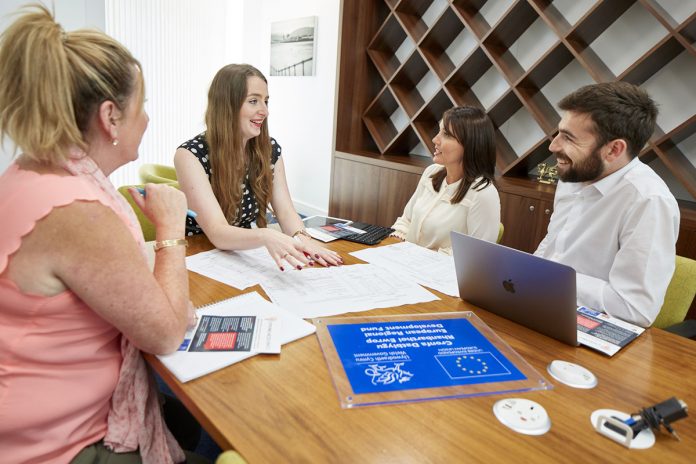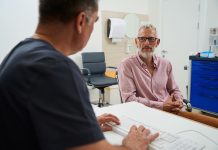Swansea University Medical School is contributing valuable work to help speed up health technology innovation in Wales
Swansea University Medical School is proud to be a partner in the new £24 million Accelerate programme.
Accelerate, which is supported by the Welsh Government and European funding, will speed up innovation in health technology in Wales. The programme is led by the Life Sciences Hub Wales and is drawing on the expertise and capabilities of Swansea University, Cardiff University and University of Wales Trinity St David to develop new, innovative healthcare products and services, which will help boost the economy and create hundreds of new high-quality jobs.
The Accelerate programme, which will run over three years, brings together clinical, academic and industry expertise to develop and roll out new, innovative products and services within the Welsh health and care system.
Professor Keith Lloyd, Head of the Medical School at Swansea University, explains that Accelerate will help build on the already strong life science sector – which is worth around £2 billion to the Welsh economy.
Professor Lloyd says: “We are delighted to be part of this exciting new Accelerate programme. The Medical School has contributed significantly to the growing life science sector through its Institute of Life Science (ILS) at Singleton campus.
“And as a top three UK Medical School, we are committed to ensuring the research, innovation and expertise within our Medical School is used to prevent ill health, develop better treatments and be at the forefront of new technologies which can be used to improve care in the NHS.
“Through the Accelerate programme, we will also be able to ensure we can improve – not only the health of people in Wales – but the wealth of the people in Wales. We will be able to take our ideas and research out of the lab and into the marketplace – helping create new firms and new high-value jobs.”
Swansea University is will create a Healthcare Technology Centre (HTC) on its Singleton Campus, the project is being led by Dr Naomi Joyce. Dr Joyce says the programme will speed up the translation of ideas from the healthcare system into new technology, products and services to create lasting economic values in Wales.
Dr Joyce notes: “Swansea University is leading the Healthcare Technology Centre (HTC). HTC completes the Technology Development & Adoption Pipeline by supporting Research and Enterprise & Innovation and associated Skills Development. HTC provides a platform for companies and researchers which builds on our research strengths in biosensors and devices, bioinformatics, bio analytics and biobanking. Opportunities which require technology development/exploitation will be progressed in partnership with the private sector, academia, the NHS and other stakeholders.
“We have a team dedicated to HTC and Accelerate based in the Medical School, this will create 16 new jobs at the School.
“The team is made up of post-doctoral, technologists, innovation specialists, technicians and project managers who will support the development of technology and innovation in the life sciences & health sectors in collaboration with industry. We are looking forward to bringing together the NHS, businesses with the world-class researchers here in Swansea.”
Cardiff University is leading the Clinical Innovation Accelerator (CIA). CIA supports the translation of medical innovation by identifying and addressing the unmet clinical need through facilitating the application of specialist research/clinical expertise and facilities. While the University of Wales Trinity Saint David is leading the Assistive Technologies Innovation Centre (ATIC). ATIC delivers devices for improved standards of living. ATIC focusses on assistive, adaptive and rehabilitative devices to improve the prevention of illness and support self-management of long-term conditions, leading to improved standards of living and maintaining active independent living.
Dr Joyce adds: “An example of how the HTC will work in practice is the development of a non-animal drug-testing model. Accelerate will assess the baseline, needs and analyse the project before recommending and agreeing on a detailed plan with HTC and project partners.
“HTC then provides dedicated resource and expertise including the provision of a research technologist to work alongside the industrial partner building on research strengths within Swansea University Medical School, to develop and test a non-animal, 3D clinically relevant model.
“The industrial partner can then use this model to assess the drug toxicology, safety and penetration. The results will inform the commercial viability of proceeding to Phase I Clinical Trials. The project will then be reviewed by Accelerate to assess the impact of the project, which may include the creation of new intellectual property (IP) and the leverage of funding to further develop the innovation.”
Welsh Government Health Secretary, Vaughan Gething adds: “Developing innovative new ways to prevent, treat and cure illness and disease is a vital part of the Welsh Government’s vision for the future of the NHS in Wales. The Accelerate programme and new health innovation centres fund will help develop new ideas for health products and services more quickly for use in our NHS and across the world.”
**Accelerate will be showcased at Swansea University’s Collaborate 2018 event. This free life science and health conference will be held on October 17, 2018, at the University’s Singleton Campus – to register visit: https://www.eventbrite.co.uk/e/collaborate-2018-tickets-48022755354?aff=es2
If you would like to get involved as a sponsor, exhibitor or event collaborator – please email the Medical School at medevents@swansea.ac.uk
For more information about the Accelerate Programme please email:
To find out more about Swansea University Medical School visit:
Please note: this is a commercial profile
Dr Naomi Joyce
Project Lead
Swansea University Medical School
Tel: +44 (0)1792 602 697











